Home Safety Tips for National Fire Prevention Week

President Calvin Coolidge proclaimed National Fire Prevention Week to commemorate the devastating Great Chicago Fire. The Great Chicago Fire burned roughly 3.3 square miles, killing about 300 people and leaving more than 100,000 people homeless. So that nothing this horrific ever happens again, we focus on making homes safe and preventing residential fires.
Reduce Fire Risks
As technology advances and people become more aware of risks associated with fires, the number of people who die in fires annually continues to decrease steadily. Fire is indiscriminate, but it’s the third largest cause of death for kids from ages one-14.
Heating is the second main cause of fires in homes. The American Red Cross offers the following helpful safety tips:
- Keep all pets and children away from space heaters
- Make sure that all flammables such as clothing, rugs, bedding, drapes, or paper remain at least three feet away from stoves, fireplaces, and space heaters.
- Look for space heaters that automatically shut off if they tip over when purchasing a heater for your home
- Never leave fires or space heaters unattended. Extinguish fires and turn heaters off when you leave a room
- Place space heaters on nonflammable, level surfaces like ceramic tiles. Placing them on carpets or rugs is a major fire risk.
Coming in at the number one spot, cooking fires are the top cause of home injuries and the majority of fires. Here are some tips to remember when cooking:
- Remain in the kitchen when cooking food at high temperatures such as broiling, frying, grilling, or boiling.
- Don’t use the oven or stove after you drink alcohol or if you’re too sleepy to remain alert.
- Keep anything that may catch fire such as oven mitts or towels off of your stovetop
- Keep an eye on the food that you’re baking, roasting, or simmering. Set a timer to help you remember that you’re cooking and stay in the kitchen.
Working Smoke Alarms are Critical
Research shows that three out of five home fires occurred in houses with no smoke alarms or smoke alarms malfunctioned. Smoke alarms are integral parts of your home fire escape plan. They act as an early warning system so that you and your family can get out of the house safely and notify authorities quickly.
The National Fire Protection Association (NFPA) provides several recommendations for residential smoke alarms:
- Smoke alarms need to be installed on every level in your home. It is also a good idea to install a smoke alarm outside sleeping areas and inside bedrooms either high on the wall or on the ceiling. The reason is because as surfaces expand and heat, air rises, lifting smoke higher.
- Test your smoke alarms on a regular basis, preferably monthly
- Replace alarms that are ten years and older.
- Change batteries in smoke alarms and carbon monoxide detectors every year
- Install smoke alarms at least 10 feet from stoves and your kitchen to reduce the number of false alarms
- If there are older people or individuals deaf or hard of hearing, use alarms that have bed shakers and strobe lights
These are just a few home safety tips to reduce fire risks. These suggestions are vital to implement and may save your life one day.
About Guardian Security
Guardian Security is the first choice for home security in Seattle and the Pacific Northwest. We service public buildings, office buildings, warehouses, homes, schools, hotels, and hospitals. Our customers have included local and national names that you know and trust.
- Guardian Security Systems, Inc. AcquiresSecurity Lock, Safe & Alarm - October 14, 2024
- COVID-19 Update from Guardian Security: Operating Safety - June 26, 2020
- COVID-19 Update from Guardian Security: We Are Still Operational - March 24, 2020

